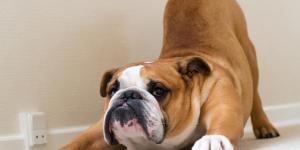My Dog Peed on My Bed - What Does It Mean?



See files for Dogs
It is bad enough when our dog pees in their own bed. It is unhygienic and can cause discomfort for the dog. When a dog pees in our bed, it is particularly frustrating as the clean up is not always easy. It can ruin sheets and even damage mattresses. If you ask yourself “why has my dog peed on my bed?”, you will want to know the answer for practical reasons. You will be able to limit this behavior and save yourself some trouble.
More importantly, understanding why your dog urinates in the house will help address the cause of this behavior. While there are circumstances when peeing in a bed is relatively normal, it can be a sign of some physical or behavioral problem which needs to be addressed. AnimalWised looks into the reasons dogs might pee in your bed or other unsuitable places in the home. As we do so, we want to stress the importance of positive reinforcement over scolding them. Scolding a dog for peeing can be counter productive, cause stress in the dog and negatively affect your bond.
Reasons why a dog pees in your bed
When we see that our dog has peed in our bed or another unusual place, we need to look at the circumstances behind this action. Many guardians might simply think that urination is related to marking territory. It is important to consider this as a possibility, but we need to consider all other factors which might contribute to it.
- Territoriality: urination is an absolutely natural and necessary act. A dog empties their bladder to eliminate toxins after metabolism. When we take our dog for a walk, we may see them urinate small amounts in increments. This is not as necessary an act, but it exists to relieve the psychological need a dog has to make themselves known in an area. It is a leftover from their wild heritage. Marking territory notifies potential mates of their presence and potential rivals of the same.
- Age: a dog's age and physical well-being is also something which needs to be considered. Very young dogs will not yet have learned where and when it is appropriate to pee. This takes toilet training, something which you should be considering from the very first day your dog comes into the family. Senior dogs may pee in your bed for the first time all of a sudden. This is usually because the effects of old age can lead to a lack of bladder control. Associated health problems of senior dogs can also contribute to this problem.
- Medical problem: whatever the age of a dog, there are medical reasons which can lead to a dog peeing all over the place. We will go into further detail below, but incontinence or an excessive need to pee can be the symptom of various diseases and health conditions.
- Fear, stress and anxiety: these emotions can cause a dog to pee inappropriately. This is a form of psychologically induced incontinence. It can happen after a traumatic event. This is something more common with adopted older dogs who may have had troubling experience and are finding it difficult to adjust to a new home. With reassurance and patience, these dogs can be reassured and trained to pee in a healthier way. Stress can also develop over time. We may think we are taking care of all of a dog's needs, but there can be many factors contributing to a dog being stressed or anxiety. Peeing in your bed is a symptom of such stress.
Whether a dog pees because of their age, health condition, stress or territoriality, it is very important not to scold the dog for this behavior. If you do, it can be very problematic. If your dog has peed in the bed, but you scold them after the fact, they may not be able to associate the scolding with the action. This can be very confusing to the dog. They will feel chastised for no reason and may become stressed. Also, peeing is natural for a dog. If you scold them for doing something natural it can be very upsetting. Instead, encouraging them to pee appropriately can be effectively done with training and patience.

How to know if a dog is peeing out of territoriality
The motivation behind why a dog pees inappropriately is part of understanding its cause. By looking at both their behavior and specifically how they urinate, we can understand whether they are marking their territory. Once we determine this, we can either learn how to change this behavior or rule it out so we can look for a different reason.
When a dog urinates at home because they have a full bladder, they will make a large puddle of pee. If a dog is marking territory, they will only express a small amount at a time. Territorial marking will also take place on elevated surfaces such as the side of a couch rather than on the floor.
If you arrive home and find your dog has produced a large puddle of pee, it is unlikely to be due to territoriality. In toilet trained dogs, it is a sign your dog has not been able to hold on until their next walk to relieve themselves. This could be resolved simply by increasing the frequency of opportunities for them to go outside. If your dog pees on your bed because they have been constrained to your bedroom for too long, the reason should be fairly obvious.
Marking territory, even inside your home, is something newly adopted dogs will often do. They want to assert their dominance in the area. This could include your bed, but it will not be limited to it. They will pee in spaces all over the house and do so only in little amounts, preferring to do so on vertical surfaces. This is why a dog marking is more likely to pee on the side of your bed rather than in it.
Helping your dog to learn how to urinate outside is something which can be done in dogs young and old. How quickly they learn will depend on the individual dog.
Medical reasons for a dog peeing in your bed
Before we consider the medical reasons for a dog peeing in our bed, we need to know if they should be in the bed in the first place. Find out more by looking at our article on why a dog sleeps with you and whether it is a good idea.
The medical reasons why a dog pees in their own bed or yours are various. It could be due to hormonal deficits, neurological problems or other pathologies which lead to urinary incontinence. In these cases, peeing inappropriately and lacking bladder control are a symptom of some larger problem. This is why it is important when understanding why a dog pees in our bed to consider any other symptoms. Taking them to the vet for a suitable diagnosis is advised.
Peeing little and often is not restricted only to marking territory. Dogs with urinary tract infections may find it difficult to pee and will only express small amounts at a time. Urinary tract diseases include cystitis, infections, kidney failure and others. Dogs may find it very difficult, uncomfortable and painful when they pee with a urinary tract disease. Cancer of the bladder, pancreatic cancer or similar tumor related diseases can also put pressure on a dog's urinary tract. This is why going to the veterinarian is so important when you see symptoms develop.
More specific to peeing in the bed are issues related to mobility. If a dog is suffering from hip dysplasia or other movement restricting conditions, then it might happen that a dog simply cannot get up in time to pee outside. They may be in too much pain to get up. This affects older dogs more than younger ones, but dogs which have received traumatic injuries might also be affected.
Another condition in older dogs is known as cognitive dysfunction syndrome. This is sometimes known as ‘canine Alzheimer's’. Alterations in the nervous system leads to the decline of cognitive, motor and sensory functions. This leads to unusual behaviors which often contradict their training. Peeing in the bed is one such behavioral change.
Other medical reasons for canine incontinence include:
- Bladder stones
- Kidney stones
- Kidney disease
- Diabetes
- Ectopic ulcers
- Urethral sphincter incompetence
- Pyometra
- Cushing's disease
- Hyperthyroidism
Going to a vet will determine the cause of canine incontinence or polyuria (the latter being increased urine production[1]). They may diagnose using a blood test, urinalysis, ultrasound or some combination thereof.

Dogs peeing for psychological reasons
There are other reasons a dog might urinate in the bed unrelated to physical health and well-being. These are problems related to their emotional well-being and may be due to various causes. They can include:
- Difficulty accessing outside: if your dog is used to urinating outside, then they will need to have easy access. If they don't, they may choose somewhere else to go so they can feel more secure. The place they choose may happen to be your bed.
- Moving home: dogs are very sensitive animals and they need a positive routine to feel safe and secure. If they feel like there is something jeopardizing their security, they can pee in the bed as a sign they are upset. Moving home is one of the biggest changes they can go through and it can be disorientating for some dogs. It may take them some time to get used to the new place and they may need retrained to ensure they pee outside. Any changes in their environment can also be upsetting.
- Poor distribution of walks: a dog's walking schedule is very important and they rely on it for many things. Not only does it give them the opportunity to urinate, it provides physical exercise and mental stimulus which are vital to a dog's well-being. While some breeds and individual dogs will need more walks than others, generally dogs require 2 to 3 walks a day. Each walk should be about 30 minutes each. If the dog does not have sufficient walks, they may develop behavioral issues such as peeing inside.
- Loneliness: if a dog is feeling lonely or ignored by their caretakers, some dogs may carry out unusual or extravagant behaviors to get attention. This could be excessive barking, destroying household objects or even urinating where they know they shouldn't. You might see it in particular if your dog greets you at the door and urinates as they get so excited to see you. Engaging and meeting their care needs should stop this behavior.
- Fear or stress: urinating where they shouldn't is a common symptom of stress in dogs. The cause of this stress is not always easy to ascertain. Loud noises such as music, fireworks or even storms can cause dogs to become very stressed. If your dog pees in your bed all of a sudden without having done it before, it could be because they have sought refuge there and become scared. However, you need to understand how important your interactions are in terms of stress. You may even do it unwittingly, but there are many behaviors which stress out dogs. If you scold them regularly or generally provide a chaotic environment, the result might be urinating in your bed.
Regardless of the cause of excessive or inappropriate peeing, you should not scold your dog for this behavior. If your dog is already stressed or displaying behavioral issues, stressing them out more is not going to help anyone. It will lead to a negative impact on their emotional well-being. In extreme cases, a dog which is mistreated in this way can lash out at others or even be a danger to themselves. Sometimes, it can be difficult to know a dog is stressed until obvious signs of pain such as excessive licking or elf-mutilation occur[2].

5 tips to prevent my dog from peeing in bed
When it comes to maintaining the good health and behavior of our dogs, prevention is key. If we don't want our furry friends to pee in their bed or ours, we must provide them with a life which is full of positivity, love and care. We also need to take certain action to give our dogs the best chance of avoiding certain medical or behavioral problems. The following guidelines are designed to ensure these needs are met.
- Preventative medicine: each geographical area has their own specific requirements for vaccination and deworming, but every dog should have a suitable schedule determined for both. Puppies should have their first shots at around 8 weeks of age. They will then need new vaccinations and boosters over the next few months. Regular check ups at the vet will help us to administer boosters as well as examine for general health problems. Providing a suitable diet is equally as important.
- Training: loving your dog doesn't mean pampering them or allowing them to do anything they want. A proper canine education is one of the most important demonstrations of affection you can give to your dog. It will help lead them to a healthy and positive coexistence. If you want to enjoy the company of a healthy, balanced and obedient dog, you can teach them the basics. Basic obedience training requires learning the commands which can be used to positively control their behavior. This avoids unwanted behaviors and can be used to help them pee outside.
- Daily walks: walking daily is more than an opportunity to pee and defecate outside. It is something most dogs will look forward to every day. When walking dogs discover thousands of new stimuli, experience new situations, meet new dogs, meet new people, expend energy and generally express themselves. All dogs need to walk daily, even if we are not as excited about the walk ourselves. If we cannot meet the responsibility of taking dogs for walks, you will need to arrange for someone to do it for us.
- Environmental enrichment: all dogs need a positive environment where they can explore, express themselves and fully develop their physical, social, cognitive and emotional abilities. If you provide an environment which is positive and free of stress, you can enrich this environment with toys such as intelligence games and chew toys.
- Positive reinforcement: as we have mentioned, punishment and other negative reinforcement are counterproductive and dangerous. To teach your dog safely, you need to stimulate their emotional responses and develop their cognitive abilities. Positive reinforcement means rewarding good action with rewards such as treats, toys or affection. This will not only stop your dog from peeing in your bed, it will cause you to develop a stronger and more rewarding bond together.

This article is purely informative. AnimalWised does not have the authority to prescribe any veterinary treatment or create a diagnosis. We invite you to take your pet to the veterinarian if they are suffering from any condition or pain.
If you want to read similar articles to My Dog Peed on My Bed - What Does It Mean?, we recommend you visit our Other health problems category.








